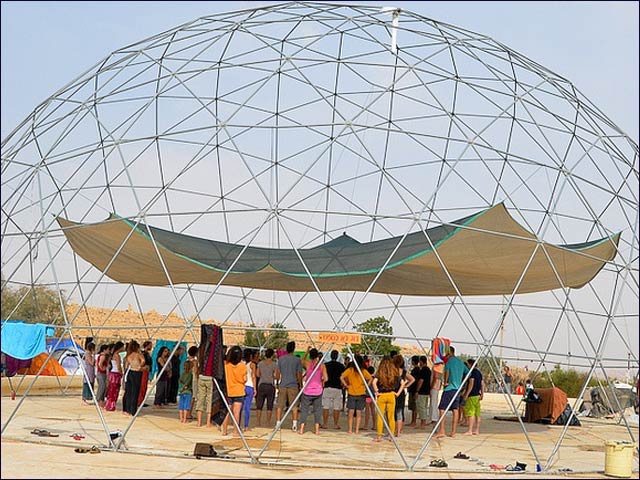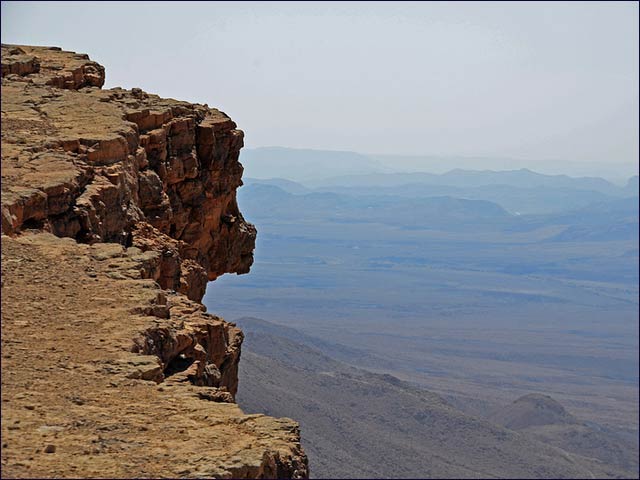By Sarah Carnvek
Tourists to Mitzpeh Ramon usually come for a day or two to visit the Ramon crater (“machtesh” in Hebrew), the biggest natural crater on Earth. So, 13 years ago when two of Israel's top choreographers moved their dance studio to the sleepy community of Mitzpeh Ramon – which besides being a tourist destination, is also a town with high unemployment rates and other social problems -- it is understandable that many assumed they had chosen to leave the arts.
But away from the competitive hustle and bustle of Tel Aviv and drawing inspiration from the quiet desert surroundings, choreographers Liat Dror and Nir Ben Gal created a new language of dance and movement. The husband-and-wife duo founded the Adama Dance Art Healing Center -- a complex that offers dance classes and meditation workshops, low-cost accommodations and a performance venue.
The name of their place, Adama, means “earth” or “land” in Hebrew.
"The silence and serenity of the desert, the space, the movement and simply being, creates magic and allows us to celebrate and dance and bring more joy to our lives," says Dror.

Adama is a popular stop for group tours.
Photo by Avi Ben Zeev They weren't leaving the arts world behind, she adds. They were simply looking for a better way to connect with it. "Our work method integrates supporting healing movement together with the accuracy and physical skill of professional dance," she says.
Word has spread that this converted industrial hangar is the place to come to be at one with nature and the arts. Adama hosts students from across Europe, throughout the United States, from South America and from around Israel who come to learn Adama's unique language of movement.
Sampling Adama
The Adama Dance Art Healing Center is located in the town's Spice Route Quarter.
The center has a variety of offerings from dance classes to breathing technique workshops. Taking into consideration that Mitzpeh Ramon is off the beaten track, and nearly 200 kilometers (120 miles) from Tel Aviv, the couple also set up eco-friendly lodgings – mud houses and teepee rooms.
Dror says the people who come to stay range from the very arty to high-tech business folk. She says Adama is for anyone open to do "deep learning."
Three times a year, Adama opens to the general public and invites people to take part in its original recipe of movement techniques. The open house events coincide with the Jewish festivals of Passover, Sukkot and Shavuot. Dror says the maximum 400 capacity is always sold out.

The center overlooks the Ramon Crater.
Photo by Tzachor Livneh"A space is created for free movement and everyone can find his own way to experience it -- as a participant or a spectator," reads the promo to the event.
Taking the stage – again
Dror and Ben Gal first took the stage together in 1987, with their highly acclaimed work “Two Room Apartment.” The duo won Israel's prestigious Shades of Dance competition with that piece – which is hailed to this day as a milestone of the contemporary Israeli dance scene for its poignant look at the intimacy of a couple’s relationship.
Their next works also received broad interest, especially “Inta Omri” -- a dance based on the music of Egyptian superstar Umm Kulthum.
Then, at the height of their fame, they moved to Mitzpeh Ramon and all but gave up life on the stage. Last year, Dror and Ben Gal felt they had found the dance language they were looking for, one that was more in tune with their views on life and healing, and that they were ready to take the stage again.
They launched "Up Chi Down Chi" to rave reviews in Israel – and are now planning a tour of Europe and the United States for the end of this coming summer.
“Up Chi Down Chi” is a play on Hebrew words. “Up Chi” is the onomatopoeic sound Israelis make when they sneeze. Chi, according to Far Eastern traditions, is life energy, causing change, reproduction, movement. The choreographers explain that "the sound that we make when we sneeze implies an uplifting of the chi."
It is a perfect example of how following the mainstream is not always the answer. Dror and Ben Gal are once again taking their unique movement language and reinventing contemporary Israeli dance.